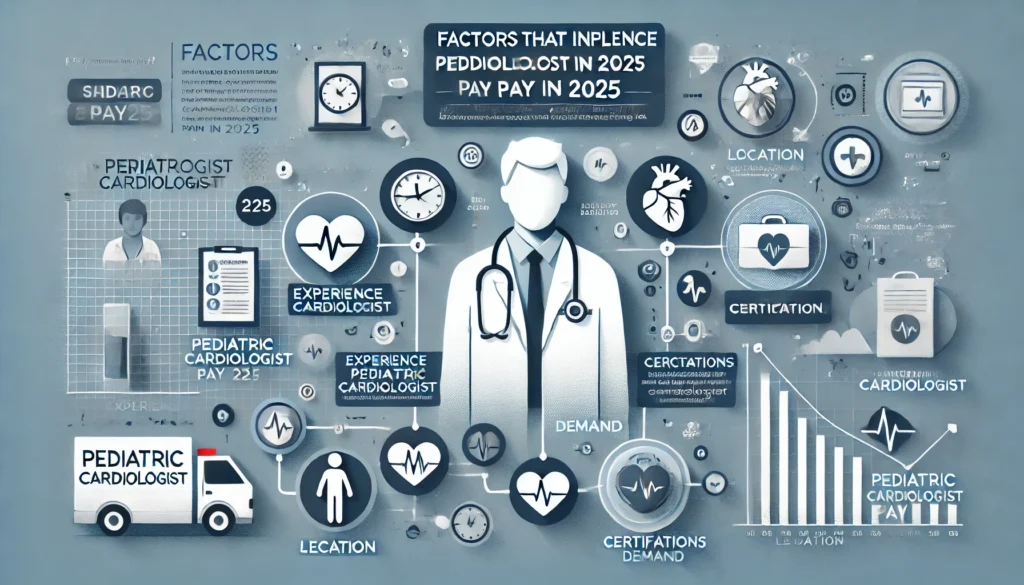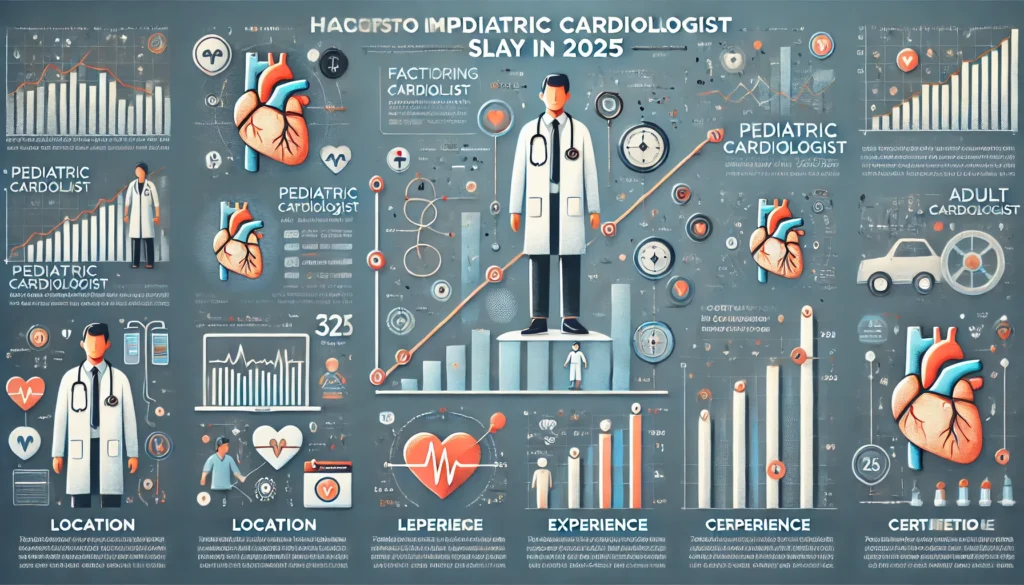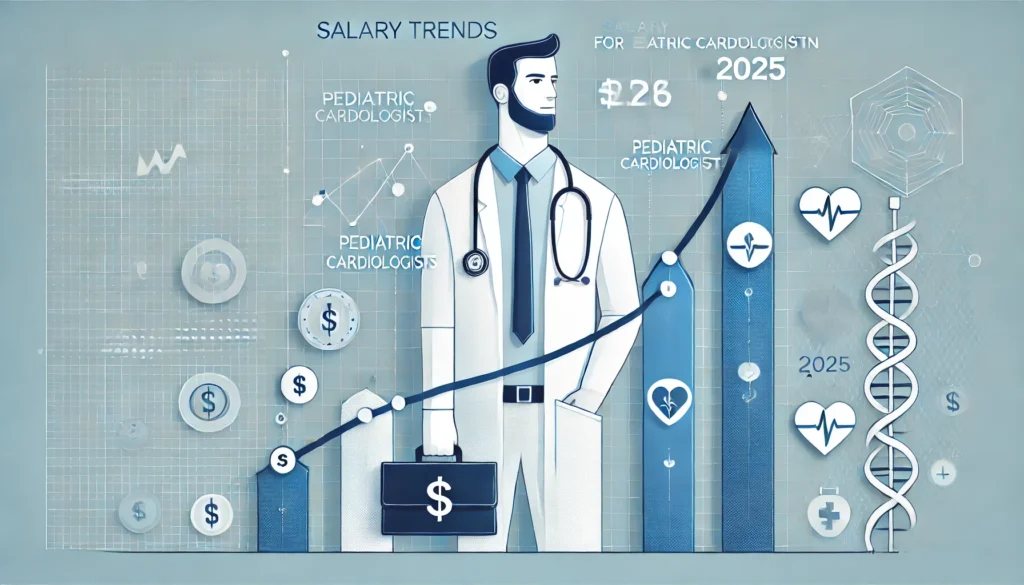How much does a Pediatric Cardiologist make in 2025, and what factors determine their salary? Pediatric cardiologists are some of the most specialized medical professionals, combining cardiology expertise with a deep understanding of child health. Their role is to diagnose, treat, and manage heart conditions in children, which requires advanced medical knowledge and a compassionate approach to caring for younger patients. However, the path to becoming a pediatric cardiologist comes with rigorous training, and the unique demands of working with children make compensation in this field an important topic for professionals and aspiring healthcare workers.
In this article, we will provide comprehensive insights into the salary of pediatric cardiologists in 2025. We will explore how their earnings compare to other cardiology fields, examine the factors influencing pediatric cardiologist salaries, and offer tips for raising your income in this highly specialized field. If you’re considering a career as a pediatric cardiologist or are curious about salary trends, this post will give you all the information you need.

Overview of Pediatric Cardiologist Salary in 2025
What is the Average Pediatric Cardiologist Salary in 2025?
In 2025, the average salary for a pediatric cardiologist in the United States is estimated to range from $275,000 to $400,000 annually. However, this figure can fluctuate based on factors such as geographic location, years of experience, and the type of healthcare facility (e.g., private practice vs. hospital).
While pediatric cardiologists earn less than their adult cardiology counterparts, their specialized knowledge and skills still place them among the higher-paid medical professionals. Pediatric cardiology is an area that demands extensive education and training, which justifies the relatively high compensation.
How the Pediatric Cardiologist Salary Compares to Adult Cardiologists
The salary of a pediatric cardiologist is typically lower than an adult cardiologist’s. On average, adult cardiologists can expect to earn between $400,000 and $600,000 annually, depending on experience and location.
The reasons for this disparity in salary are multifaceted:
- Smaller patient pool: Pediatric cardiologists work with a much smaller patient base than adult cardiologists. The overall number of pediatric patients needing specialized heart care is lower than that of adults.
- Increased reliance on teamwork: Pediatric cardiologists often work as part of a team, including pediatricians and other specialists, which can impact individual pay.
Despite these differences, pediatric cardiology remains a rewarding and essential field in healthcare.
Factors That Influence Pediatric Cardiologist Pay
Several factors determine the salary of a pediatric cardiologist, including:
- Geographic location: In areas with higher living costs or increased demand for pediatric services, salaries are generally higher. For example, pediatric cardiologists in major urban centers like New York or California may earn more than those in rural areas.
- Experience and education: Pediatric cardiologists with more experience or additional certifications can command higher salaries.
- Type of employment: Those employed in private practice or leading their own clinics might earn more compared to those working in academic settings or hospitals. However, hospital positions often come with additional benefits and job security.

Pediatric Cardiologist vs Other Medical Specialties
Comparing Pediatric Cardiologists with Pediatricians
While pediatricians are general healthcare providers for children, pediatric cardiologists specialize in heart diseases, which requires additional education and training. Pediatricians typically earn an average salary between $180,000 and $250,000 annually, depending on experience and location.
Thus, pediatric cardiologists earn more than pediatricians due to the extra years of training required, the complexity of their work, and the higher level of specialization. Pediatric cardiology also involves dealing with rare and complex conditions requiring advanced diagnostic and treatment skills.
How Pediatric Cardiologist Earnings Compare to Adult Cardiology Specialties
The difference in pay is significant when comparing pediatric cardiologists to adult cardiologists. Adult cardiologists earn substantially more due to the higher demand for cardiology services in the general population, the volume of patients they treat, and the broader scope of services they offer.
However, pediatric cardiology provides a unique challenge, and the skill set required to care for children with congenital heart defects, arrhythmias, and other heart conditions can lead to a rewarding career in its own right, even with the lower average salary.
What Makes Pediatric Cardiologists Unique in Terms of Pay?
The unique demands of pediatric cardiology contribute to both the salary and the challenges within the field. Some factors include:
- Emotional labor: Treating children often involves emotional and psychological challenges that can affect a pediatric cardiologist’s work-life balance.
- Complex diagnoses: Diagnosing heart conditions in children can be more challenging than in adults, as symptoms can be subtler, and the physiological differences between children and adults are vast.
- Less volume but high expertise: Pediatric cardiologists usually see fewer patients than adult cardiologists but must apply specialized knowledge to each case, which justifies the higher salary compared to general pediatricians.

Key Factors Affecting Pediatric Cardiologist Salary
Impact of Specialized Training and Certification on Earnings
To become a pediatric cardiologist, one must complete extensive training, including:
- Medical school (typically 4 years)
- Pediatrics residency (3 years)
- Cardiology fellowship (3-4 years)
- Pediatric cardiology fellowship (2-3 years)
Beyond the basic requirements, pediatric cardiologists often obtain board certifications in pediatric cardiology, which can further enhance their earning potential. Board-certified pediatric cardiologists tend to earn more because certification signals expertise and proficiency in the field.
Additional certifications in areas like pediatric electrophysiology or pediatric heart transplantation can lead to even higher pay.
The Role of Experience in Salary Growth
Experience plays a crucial role in salary progression. Pediatric cardiologists who have spent 10-20 years in the field typically see significant salary increases over time, often reaching the upper end of the salary spectrum. Experience brings clinical expertise and opportunities to move into leadership roles, take on academic appointments, or work in private practice, which can further enhance income.
Experienced pediatric cardiologists may earn over $400,000 annually, especially in private practice or highly specialized settings.
Geographic Location and Pediatric Cardiologist Salary Variance
As with most healthcare professions, location plays a significant role in determining salary. Pediatric cardiologists practicing in cities with a high cost of living, such as New York, Los Angeles, or Chicago, can earn significantly more than those in rural or suburban areas. Similarly, regions with a higher demand for pediatric heart specialists may offer higher compensation to attract top talent.
For instance, pediatric cardiologists in major metropolitan areas may earn $350k to $450k, while those in less populated regions may see salaries between $275k and $350k.
Check out healthcare salary variations across the U.S. to see where your field is most lucrative.

Pediatric Cardiologist Salary Growth and Trends
Salary Growth Over the Next 5-10 Years
The demand for pediatric cardiologists is expected to increase over the next decade due to the growing recognition of congenital heart conditions and the need for specialized care. As more children survive congenital heart diseases, the need for long-term care and specialized heart treatment will continue to rise.
As a result, pediatric cardiologists can expect steady salary growth, especially in regions with underserved populations. The future of pediatric cardiology is promising, with salary projections likely to increase as demand for pediatric cardiology services grows.
Potential for Increased Earnings through Continuing Education
Pediatric cardiologists who continue their education by pursuing additional certifications, attending specialized training programs, or teaching may be able to increase their earnings. Specializing in subfields such as pediatric electrophysiology or fetal cardiology can create opportunities for higher-paying roles and increased responsibilities.
Furthermore, physicians at the cutting edge of new medical technologies and treatments are often in higher demand, which may lead to increased compensation.
The Role of Pediatric Cardiologists in the Healthcare Industry’s Future
As healthcare evolves, pediatric cardiologists will address long-term care for children with heart conditions. More congenital heart defect survivors will increase demand for their expertise. This role’s growth may drive salary increases, offering a promising future for professionals.
Tips for Raising Your Pediatric Cardiologist Salary
Negotiating Your Pediatric Cardiologist Salary
Effective salary negotiation is one of the best ways to increase your earnings as a pediatric cardiologist. Be sure to:
- Research average salaries in your region and specialty.
- Leverage any additional certifications or specialized skills.
- Be prepared to negotiate based on experience, skill level, and geographic location.
Discover comprehensive salary negotiation strategies tailored to healthcare professionals.
For tips on maximizing earnings, check out this guide on pediatric nurse salary negotiation.
Conclusion
In conclusion, the Pediatric Cardiologist Salary in 2025 reflects a combination of factors, including specialized training, geographic location, and years of experience. While pediatric cardiologists may earn less than their adult cardiology counterparts, the field offers unique challenges and rewards that make it both a fulfilling and lucrative career. Those who pursue advanced certifications, gain additional experience, and work in high-demand regions can raise their earning potential over time. As the demand for specialized care in pediatric cardiology continues to grow, so will opportunities for increased compensation. Whether you’re just starting your career or looking to expand your expertise, understanding the key factors influencing pediatric cardiologist salaries is essential for making informed decisions about your professional future.
table summarizing the key data from trusted salary surveys and sources:
| Source | Average Pediatric Cardiologist Salary (2025) | Geographic Location | Additional Notes |
|---|---|---|---|
| Medscape 2025 Salary Survey | $320,000 – $375,000 | Nationwide (US) | Varies by region, with higher earnings in urban areas |
| Bureau of Labor Statistics (BLS) | $300,000 – $380,000 | Nationwide (US) | Reflects data from pediatric cardiologists in hospitals |
| Salary.com | $290,000 – $400,000 | US Regional Variance | Private practice positions often offer higher salaries |
| PayScale | $275,000 – $350,000 | Nationwide (US) | Lower earnings for new pediatric cardiologists |
| American College of Cardiology | $325,000 – $450,000 | Urban vs Rural (US) | Salary variations based on demand and cost of living |
FAQ Section:
1. What’s the average pediatric cardiologist salary in 2025?
$275k–$400k, based on location, experience, and facility type.
2. How do their salaries compare to adult cardiologists?
Pediatric cardiologists earn less, while adult cardiologists make $400k–$600k due to higher demand and larger patient bases.
3. What factors affect their salary?
Location, experience, certifications, and facility type (hospital, private practice, or academic).
4. Can they earn more over time?
Yes, with experience, specialized training, and leadership roles.
5. How can they increase their salary?
Get certifications (e.g., electrophysiology or fetal cardiology), gain experience, and take leadership roles.







